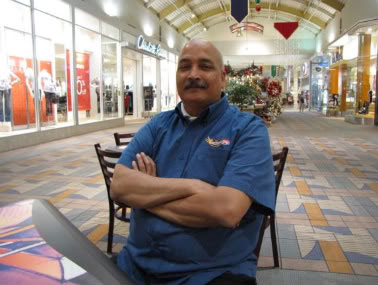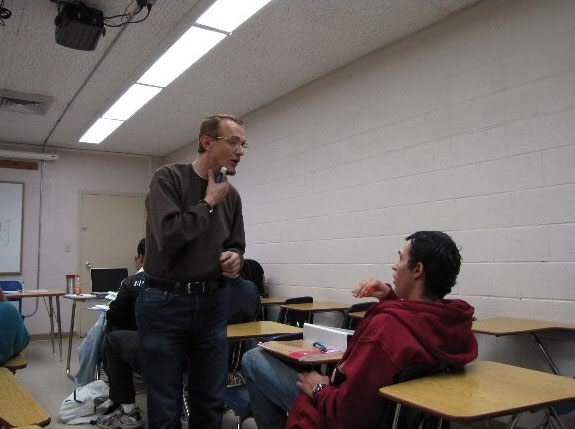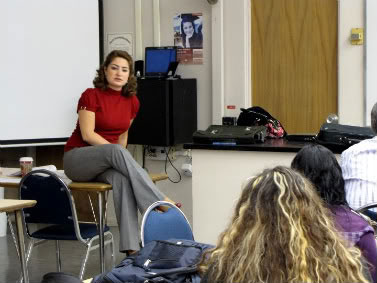
Sam Shamsy sits in the Imperial Valley Mall near his Dairy Queen franchise. Originally from India, Shamsy has been in the states for 30 years now. Despite having been robbed many times at his old business, Shamsy believes "all people are beautiful." (Ana Cuevas/Borderzine.com)
EL CENTRO, Calif. – The cash registers sit patiently, like Venus flytraps eager to be fed. Employees begin to prepare themselves mentally.
Suddenly, a mob, a stampede, a crowd, a giant mosh of consumers makes its way through the doors of the Imperial Valley Mall. Lines form at almost every store. The cash registers begin their feast. Within minutes, walking becomes pushing. It’s time to buy.
From behind the counter of his Dairy Queen, Sam Shamsy stares at the scene, patient and monk-like. Another long day of work awaits him. Ice cream is still a must in the Imperial Valley, since the winter months still manage to break sweat.
Shamsy is an immigrant from India who came to the United States over 30 years ago. He first settled in New York City, and then Texas. The family man, a father of three girls, felt that the fast pace of the big city was too much and drained his family time.
“For me, one of the most important things is safety. I feel secure here. Before that, when I owned gas stations, I always got robbed. And I was always working; I was tired of working late nights and early mornings,” Shamsy said.
So he decided to find a business in a calmer place. He applied to purchase a Dairy Queen franchise and was sold one at the Imperial Valley Mall in 2003. The Imperial Valley, a place he had never heard of, proved to be a good fit for him. The valley borders Baja Mexico in southeastern California, between the Arizona state line and San Diego.
“Before this, I had never heard of El Centro. But the one thing I like is that the people are beautiful. The prettiest of all. But the weather is very hot,” Shamsy said.
Shamsy is not the only Indian immigrant in the valley. In fact, men from both the Indian and Pakistani Punjab region came to the Imperial Valley around the 1920’s to find work, particularly in the fields. An old Punjabi saying claims that, “A man is no Punjabi if he has no land.”
Apart from Indian immigrants, the Imperial Valley is home to many immigrants from the Middle East, most of whom come here to find work. According to the 2000 U.S. Census, there are 410 citizens of Arab descent in the Imperial Valley.
“My parents came down here from Palestine in the 70’s. Over there it’s really hard to get jobs, but here there are more opportunities.” says Amal Ali, a 19-year-old Imperial Valley College student.
The business link between the valley and Middle Eastern countries appears to go both ways. Imperial Valley College (IVC) has introduced a first-level Arabic class. According to Arabic Professor Aziz Abdin, the class was full within the first week and “had 15 to 20 crashers.”

Imperial Valley College Arabic instructor Aziz Abdin, left, teaching liberal arts student Martin Tejada, how to articulate the different Arabic sounds. (Ana Cuevas/Borderzine.com)
“The Arabic language has become extremely popular for a couple of reasons,” Abdin said. “I mean, for Iraq, for the opening of the Middle Eastern world. When I ask my students why they want to take the class, many say for job opportunities. We have some from the army, a guy from immigration.”
Denise Beas, an IVC student enrolled in the Arabic class, and majoring in business, says she wants to learn the language so that she can do business in Saudi Arabia. Her family owns a miscellaneous import and export business in Mexicali, the Imperial Valley’s neighbor south of the border.
The class also serves as a vessel to provide the students with a better cultural understanding. “I add to the class syllabus something to teach them about the culture,” Abdin explained. “If the students have to go sometime to Iraq or to any Arab country, they’ll know something about the culture. That is why I invited a speaker of Syria.”
Imperial Valley is predominantly Hispanic. Out of the 142,361 citizens of the Imperial Valley, 102, 817 are Hispanic. Many of the immigrants of Middle Eastern descent have had to face prejudices and misconceptions about their race and culture.

Rena Mardini, 23, a guest speaker in the Arabic 100 class at Imperial Valley College, answers students' questions about the Arabic culture. Mardini’s presentation, “Sleeping Beauty," offered insight to the culture of her native Syria. (Ana Cuevas/Borderzine.com)
“I had a teacher tell me once that we are the new ‘niggers’ ” says Ali.
“People think we’re all terrorists. It hurts. I literally didn’t know the meaning of the word terrorist until the war happened. I freaked out, but there are extremists everywhere,” Ali said.
Abdin’s aim is to have students leave his class with a clear understanding of the language and of the culture.
“Sometimes I get frustrated, sometimes I feel like I need to work harder, but I am glad God brought me here to this country. Freedom of speech, land of opportunity. I shouldn’t waste an opportunity to make a lot of friends here and educate them.”
